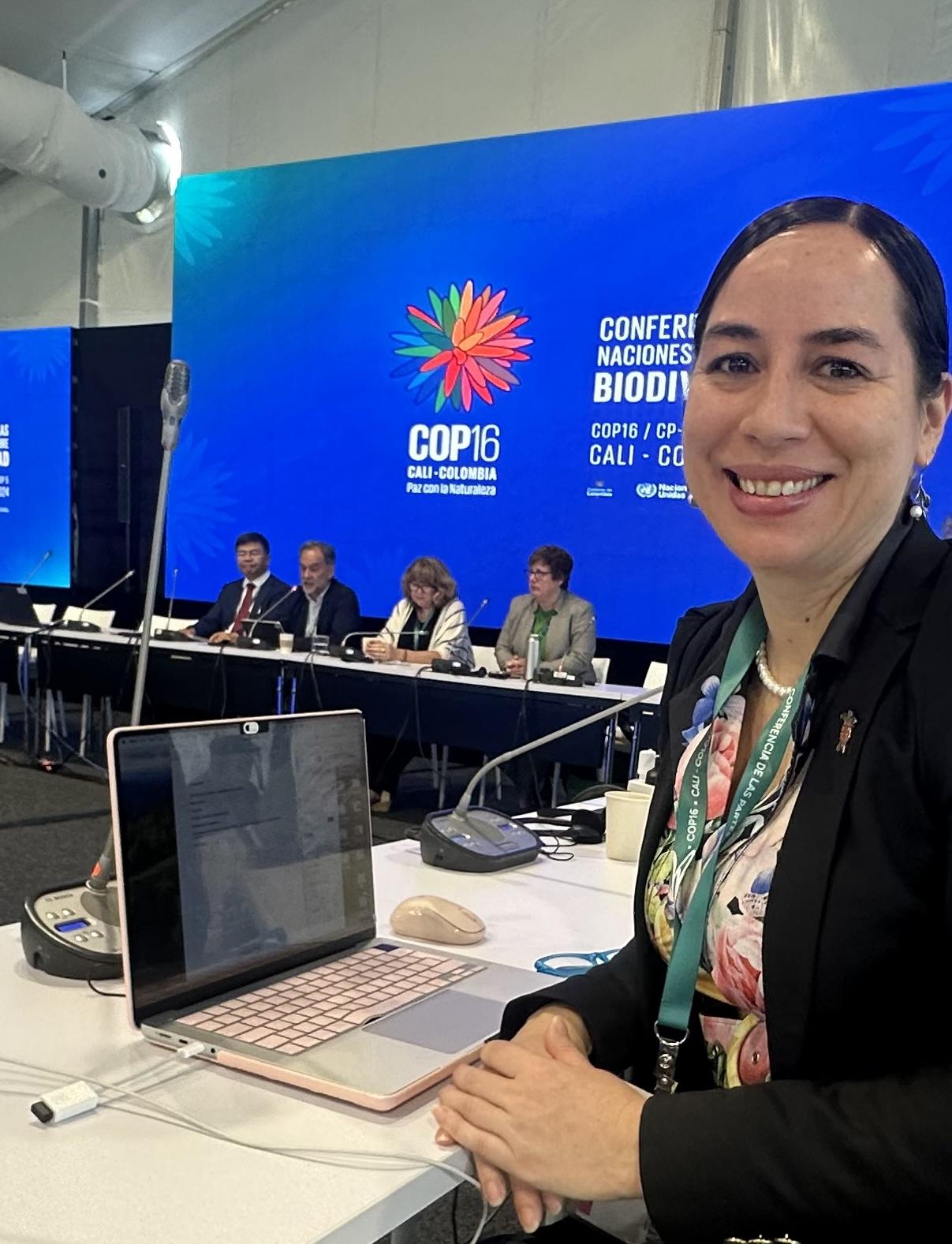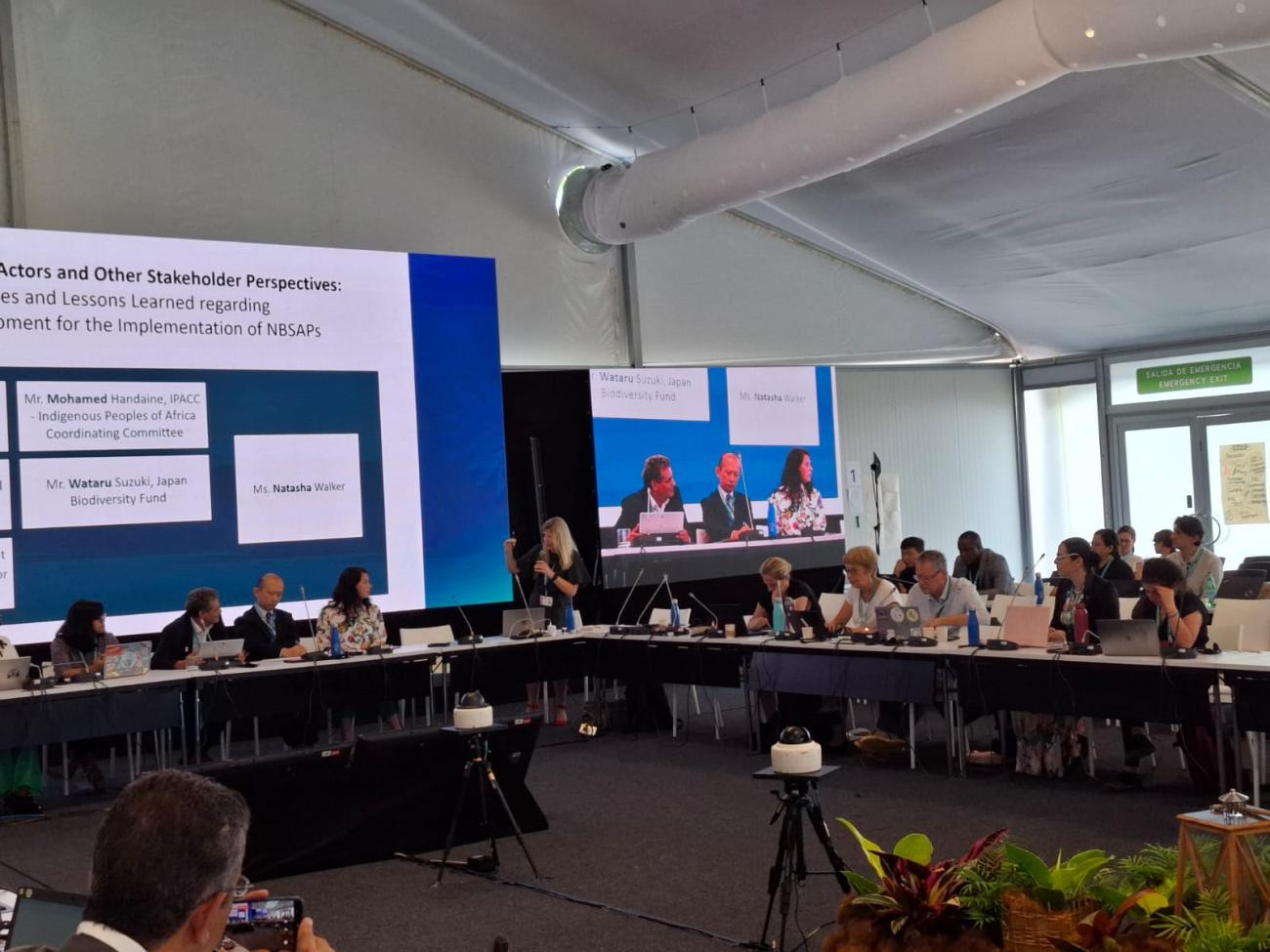Thousands of people had descended on the Colombian city of Cali for the UN biodiversity summit COP16, among them is ECI DPhil student Paola Fajardo.
‘COP’ meaning ‘Conference of the Parties’ is the regular meeting of Parties to a particular United Nations (UN) Convention. In this case, Parties to the UN Convention on Biological Diversity (CBD), or UN Biodiversity Convention. They’re meeting for the sixteenth time – hence COP16.
The last Biodiversity Conference (COP15) was held in Montreal in 2022, where the historic and ambitious Kunming-Montreal Global Biodiversity Framework (GBF) was agreed. The GBF outlines four long-term goals towards a world living in harmony with nature by 2050, and twenty-three short-term targets to achieve this vision by halting and reversing biodiversity loss by 2030.
The Parties meet every two years to push forward the biodiversity agenda. It’s a critical moment as COP16 is the first time Parties gather after the approval of the GBF to assess their progress toward the 23 targets agreed in Montréal, present new or updated National Biodiversity Strategies and Action Plans (NBSAPs) and agree on several items including the mechanisms for financial resource mobilisation.
Paola Fajardo reflects on proceedings so far…

In decision 15/8, the Conference of the Parties (COP) to the United Nations Convention on Biological Diversity (UN CBD) requested the Executive Secretary to convene, in collaboration with partners, recalling Articles 15.6, 16, 17, 18 and 19 of the Convention, a forum to facilitate networking and sharing of experiences, good practices and lessons learned in capacity-building and development for biodiversity, and to organise events to showcase technical and scientific cooperation initiatives, technologies and opportunities. With a focus to support the successful and effective implementation of National Biodiversity Strategies and Action Plans (NBSAPs) and the Kunming-Montreal Global Biodiversity Framework (GBF).
As a result, on 19 October 2024 in Cali, Colombia, previous to COP16 it was organised back-to-back with the Subsidiary Body on Implementation (SBI), the inaugural Biodiversity Capacity-Building and Development Forumconvened by the Secretariat of the UN CBD in collaboration with the Government of Colombia, the NBSAP Accelerator Partnership and other partners. It brought together representatives of Parties, Indigenous Peoples, local communities, women, youth, NGOs, UN agencies, academia, private sector and stakeholders involved in capacity development and technical and scientific cooperation for biodiversity.
The Forum was opened by Ms Astrid Schomaker, CBD Executive Secretary, Mr Mauricio Cabrera Leal, Vice Minister of Environmental Policies, Ministry of Environment and Sustainable Development of Colombia, Mr Ning Liu, Director General, Ministry of Ecology and Environment of China, COP 15 Presidency, and Ms Inka Gnittke, Deputy Director General, Federal Ministry for the Environment of Germany.
Delegates accredited to attend COP16 and with experience in capacity development were invited to participate. Yet, to take part in the forum only one delegate could be nominated per organisation, and I had the great honour to be nominated by the University of Oxford.
During the forum, I shared my experience with capacity development of multiple stakeholders for nature protection and recovery in Mexico, in a previous role as Program Officer and as part of my PhD at Oxford. Specifically, I intervened during the forum mentioning that “we do no need to reinvent the wheel, that there are very successful case studies of capacity development at the country level”, including community-to community training examples. I also highlighted the importance of respecting, recognising and considering the expertise at national and local levels to design and implement bottom-up capacity development initiatives considering the needs, aspirations, knowledge and expertise of rightsholders, local actors, and Parties.
In the forum we engaged in working groups to identify what works and what doesn’t work in capacity development and to determine recommendations with the focus of promoting the strengthening of capacities for the successful and effective implementation of the GBF and the NBSAPs, which are the mechanism Parties use determine their priorities, targets, ambitions and actions to implement and collectively achieve the goals and targets of the GBF.

I facilitated one of the working groups and presented a summary of our suggestions to other working groups. As part of the process and objectives of the Forum, we also selected/drafted two recommendations per group to be presented to all the participants for their discussion, and I had the great honour to be selected by my group to present our two recommendations to the audience.
We need concrete effective actions to tackle and reverse biodiversity loss based on nature and human rights approaches. Therefore, a key element that was agreed during the Forum is that all sectors of society need to enable and be involved in biodiversity mainstreaming and constantly engaged in capacity development as implementers and recipients.
One of the recommendation that was proposed by my group based on initial eight recommendations is to;
design bottom-up and country-based demand-driven multi-year biodiversity and capacity-building programmes and initiatives with long-term financial support taking into account the needs, cultures, worldviews, different knowledge systems, socio-ecological contexts and priorities of local communities and rights-holders to empower local leadership for the effective and meaningful, rights-based, transformative, cross-sectorial implementation of the GBF and NBSAPs at the National level."
The second recommendation refers to the;
translation of the GBF and NBSAPs into national legislation, laws, government programs and in all national languages and dialects by Parties to create awareness at the national level and mainstream the biodiversity, degradation and climate change emergencies through participatory and collaborative approaches that include multiple-stakeholders, such as, policy-makers, local governments, government agencies, NGOs, Indigenous Peoples, Local Communities, Women, and Youth, for the effective, rights-based, transformative, cross-sectorial and meaningful implementation of the GBF and NBSAPs at the National level."
A summary of the recommendations proposed and presented by the working groups and discussed with the attendants during the Forum will be delivered at the High-Level Segment of COP16 on 30 October, which will be attended by around ten Heads of State, and almost 100 Ministers. The outcomes of the Forum will be also made available on the website of the CBD for use by Parties and relevant stakeholders, as appropriate, to improve the planning, design and implementation, monitoring and evaluation of their capacity-building and development and technical and scientific cooperation initiatives.
Stay tuned.
Hear more from Paola
Video transcript
I’m happy to share that I participated in the first Biodiversity Capacity-building and Development Forum of the CBD which was designed to share experiences, practices and lessons learned.
The Forum brought together representatives of Parties, Indigenous Peoples, local communities, women, youth, NGOs, UN agencies, academia and other stakeholders involved in capacity development and technical and scientific cooperation for biodiversity.
I shared my experience with capacity development of multiple stakeholders for nature protection and recovery in Mexico in a previous role as Programme Officer and as part of my PhD at Oxford, considering the needs, aspirations, knowledge, and expertise of rightsholders and local actors.
In the Forum, we engaged in working groups to identify the strengths and failures in capacity development and to determine recommendations with the focus of promoting the strengthening of capacities for the successful implementation of the NBSAPs and the GBF.
We need concrete effective actions to tackle and reverse biodiversity loss based on nature and human rights approaches. Therefore, a key element that was agreed during the Forum is that all actors of society need to enable and be involved in biodiversity mainstreaming and constantly engaged in capacity development as implementers and recipients.
A summary of the recommendations will be delivered at the High-Level Segment of COP16 that will be attended by around ten Heads of State and more than 100 Ministers of the Environment.
Stay tuned.

